Always and teens learned yes sir worked better than what the f do you want .Bring back carding and pulling over cars with 3 or more teens. It worked before...
Gun Control is Completely Useless.
- Thread starter Colpy
- Start date
You are using an out of date browser. It may not display this or other websites correctly.
You should upgrade or use an alternative browser.
You should upgrade or use an alternative browser.
What we have is not a government or justice system that takes gun crime seriously, but a whole group of people who want to be seen doing something. They want to claim they are acting on the issue even if they get no results.
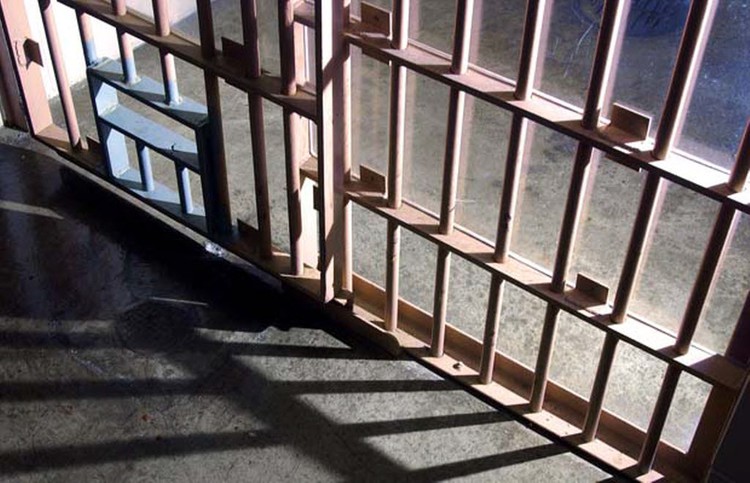
 apple.news
apple.news
If most Canadians heard that smuggling close to 250 handguns into Canada would see you get day parole after just one year, they might be shocked. Yet, that’s the case of a man who was convicted of gun smuggling in July 2021.
So much for Trudeau’s promise of being tough on gun crime.
William Rainville pleaded guilty just over a year ago to bringing in the bodies of 248 Polymer80 Glock-type pistols without serial numbers. There were also high-capacity magazines and other parts for these illegal weapons.
The estimated street value of all the gear was $1.6 million on the black market.
Despite a five-year sentence, he’s being transferred to a halfway house and allowed day parole after just one year in jail.
LILLEY: Man out of jail year after conviction for smuggling 248 guns into Canada — Toronto Sun
If most Canadians heard that smuggling close to 250 handguns into Canada would see you get day parole after just one year, they might be shocked. Yet, that’s the case of a man who was convicted of gun smuggling in July 2021. So much for Trudeau’s promise of being tough on gun crime. William...
If most Canadians heard that smuggling close to 250 handguns into Canada would see you get day parole after just one year, they might be shocked. Yet, that’s the case of a man who was convicted of gun smuggling in July 2021.
So much for Trudeau’s promise of being tough on gun crime.
William Rainville pleaded guilty just over a year ago to bringing in the bodies of 248 Polymer80 Glock-type pistols without serial numbers. There were also high-capacity magazines and other parts for these illegal weapons.
The estimated street value of all the gear was $1.6 million on the black market.
Despite a five-year sentence, he’s being transferred to a halfway house and allowed day parole after just one year in jail.
Most crime guns seized by police in Canada’s largest city this summer came from outside of Canada, according to data gleaned from a Toronto police Twitter account.
“We’re now at the stage where pistols, revolvers and handguns are now the weapon of choice for criminals.”
Blandford, who served for three decades as a cop, said the sheer length of the land border and unpatrolled coastlines make smuggling American firearms into Canada a nearly unstoppable phenomenon.
A key part of the Trudeau Liberals’ gun strategy are greater restrictions for licensed gun owners, including bans on so-called “assault” rifles and allowing municipal handgun bans.
Last month, Public Safety Minister Marco Mendicino and Foreign Affairs Minister Melanie Joly sidestepped parliamentary approval and temporarily banned handgun imports, a step towards a national freeze on the sale, transfer and ownership of handguns.
Justifications for such bans rely on claims of reducing street guns obtained via theft, but the Toronto police 2021 statistical report suggests such instances are rare.
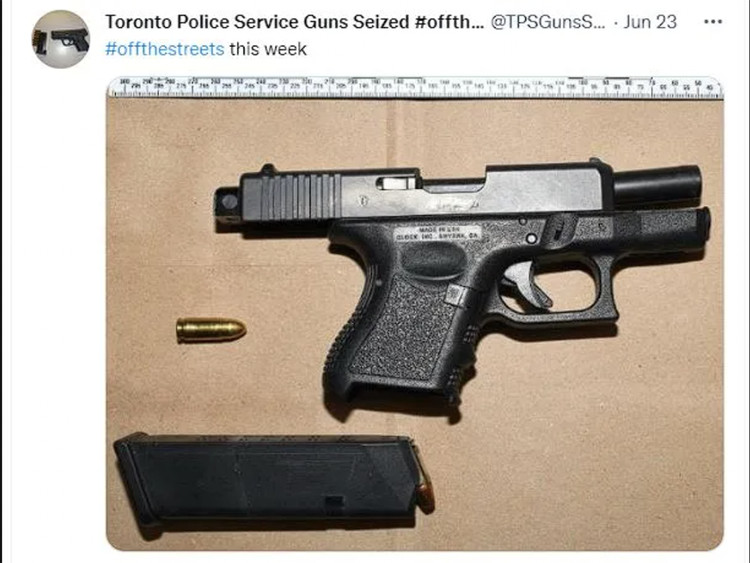
 apple.news
apple.news
Earlier this year, police chiefs testifying before the commons public safety committee said bans were of little use to police.
“Most laws we create are not going to be followed by people committing crimes with guns,” said Regina Police Chief Evan Bray.
Toronto Deputy Chief Myron Demkiw testified 86 per cent of crime guns were smuggled into Canada.
Blandford said facing the nearly insurmountable task of securing Canada’s porous borders and coastlines, it’s not surprising Ottawa went after low-hanging fruit of punishing gun owners.
“Legal gun owners go through rigorous processes to be vetted to own a firearm,” he said.
“Legitimate gun owners, whether they’re handgun or long-rifle, are probably amongst your most law-abiding citizens in the country.
“They’re not the problem.”
“We’re now at the stage where pistols, revolvers and handguns are now the weapon of choice for criminals.”
Blandford, who served for three decades as a cop, said the sheer length of the land border and unpatrolled coastlines make smuggling American firearms into Canada a nearly unstoppable phenomenon.
A key part of the Trudeau Liberals’ gun strategy are greater restrictions for licensed gun owners, including bans on so-called “assault” rifles and allowing municipal handgun bans.
Last month, Public Safety Minister Marco Mendicino and Foreign Affairs Minister Melanie Joly sidestepped parliamentary approval and temporarily banned handgun imports, a step towards a national freeze on the sale, transfer and ownership of handguns.
Justifications for such bans rely on claims of reducing street guns obtained via theft, but the Toronto police 2021 statistical report suggests such instances are rare.
Most of the crime guns seized in Toronto are smuggled into Canada from U.S.: police — National Post
Last month, Public Safety Minister Marco Mendicino and Foreign Affairs Minister Melanie Joly sidestepped parliamentary approval and temporarily banned handgun imports
Earlier this year, police chiefs testifying before the commons public safety committee said bans were of little use to police.
“Most laws we create are not going to be followed by people committing crimes with guns,” said Regina Police Chief Evan Bray.
Toronto Deputy Chief Myron Demkiw testified 86 per cent of crime guns were smuggled into Canada.
Blandford said facing the nearly insurmountable task of securing Canada’s porous borders and coastlines, it’s not surprising Ottawa went after low-hanging fruit of punishing gun owners.
“Legal gun owners go through rigorous processes to be vetted to own a firearm,” he said.
“Legitimate gun owners, whether they’re handgun or long-rifle, are probably amongst your most law-abiding citizens in the country.
“They’re not the problem.”
But.... But... But... if we make it DOUBLE mega hyper super squirrel illegal there's no WAY they'll break THAT law!! Right? Right guys? Guys?“Most laws we create are not going to be followed by people committing crimes with guns,” said Regina Police Chief Evan Bray.
Nah, you should do what we do. Make it easier to buy an AR-15 than a pack of smokes.
Nothing bad will happen.
Nothing bad will happen.
Nothing bad did happen when it was. And in fact as we've discussed i've got plenty of firearms in my own collection that would do more damage faster than that gun will in close quarters. and they're in every sporting goods store. You should know better than to suggest that whole one gun is 'more deadly' than another argument.Nah, you should do what we do. Make it easier to buy an AR-15 than a pack of smokes.
Nothing bad will happen.
And the bad guys aren't using rifles, they're using pistols. And as noted - they're not using ones that were owned by Canadians. Turns out that criminals aren't afraid to break the law and occasionally smuggle goods.
Now if we took the billions going into 'gun buy backs' and enforcing useless laws and used that to chase bad guys and border hoppers... we might actually make a difference.
The demographics of the criminals dictate that any actions taken to reduce gun crime are in fact racist.Now if we took the billions going into 'gun buy backs' and enforcing useless laws and used that to chase bad guys and border hoppers... we might actually make a difference.
OK, thanks for letting us know that the Uvalde shooter used a pistol. I coulda swore it was an AR-15.Nothing bad did happen when it was. And in fact as we've discussed i've got plenty of firearms in my own collection that would do more damage faster than that gun will in close quarters. and they're in every sporting goods store. You should know better than to suggest that whole one gun is 'more deadly' than another argument.
And the bad guys aren't using rifles, they're using pistols. And as noted - they're not using ones that were owned by Canadians. Turns out that criminals aren't afraid to break the law and occasionally smuggle goods.
Now if we took the billions going into 'gun buy backs' and enforcing useless laws and used that to chase bad guys and border hoppers... we might actually make a difference.
Uhhh - uvalde is in the united states. This is "C.A.N.A.D.A". Pay attention. Americans do all kinds of crap we don't do.OK, thanks for letting us know that the Uvalde shooter used a pistol. I coulda swore it was an AR-15.
And as near as i can tell that really wasn't a bunch of 'criminals' or 'crime' gun issue, that was someone going nuts and killing people at random. They can use anything for that and have. The biggest mass murders in the states didn't involve guns.
So different country, different issue and kind of wrong anyway ... but hey nice attempt to change the channel
3D printed firearms slowly on the rise
Author of the article:Kevin Connor
Publishing date:Sep 03, 2022 • 14 hours ago • 1 minute read • Join the conversation
A 3D printer and 3D printed firearms recently seized by Calgary Police.
A 3D printer and 3D printed firearms recently seized by Calgary Police. PHOTO BY HANDOUT /Calgary Police
While 3D guns are the latest problem for law enforcement in some parts of the country, Toronto has so far been somewhat spared.
“While we haven’t seen a rise in 3D guns in particular in Toronto (since 2020 TPS has seized a total of 8, 3D printed gun or gun parts), TPS is increasingly seizing guns that are privately manufactured without serial numbers. These can include 3D printed firearms, converted pellet style guns and other homemade firearms,” Toronto police said in an email.
Calgary police recently laid 66 charges against two men allegedly running a firearms production and trafficking operation.
To date this year, Calgary police have seized 1,229 firearms, including 316 firearms determined to be crime guns, which are firearms unlawfully used, unlawfully possessed.
Nine per cent of the seized guns were homemade 3D printed guns, which police say is a significant increase from past year.
“3D printed firearms are a growing trend that we are working to address through targeted enforcement,” says acting Staff-Sgt. Ben Lawson, of the Calgary Police Service Firearms Investigative Unit.
“3D printed guns function just like any other firearm and have the potential to cause real danger to our community. The Firearms Investigative Unit supports in all crime gun investigations and works with other areas in the Service to gather information and specifically target those responsible for trafficking firearms in Calgary.”
A 3D printer and 3D printed firearms recently seized by Calgary Police.
A 3D printer and 3D printed firearms recently seized by Calgary Police. PHOTO BY HANDOUT /Calgary Police
In November 2020, police became aware of an individual believed to be involved in the trafficking of firearms and allegedly learned he had recently purchased a 3D printer to manufacture firearms.
In May 2022, they executed search warrants at two residences and allegedly seized 3D printers, five complete 3D printed Glock-style handguns with magazines, five 3D printed Glock-style lower receivers, and additional firearm parts, including trigger parts, slides and barrels, and ammunition.
Two individuals have been arrested and now face multiple charges manufacturing, possession of firearms or restricted device.
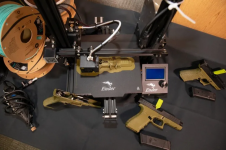
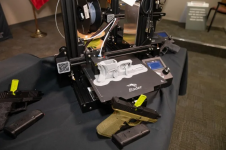
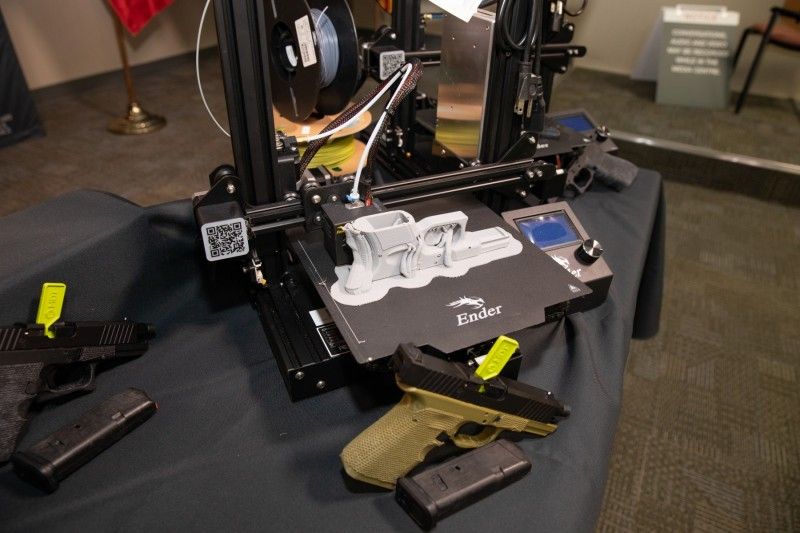
 torontosun.com
torontosun.com
Author of the article:Kevin Connor
Publishing date:Sep 03, 2022 • 14 hours ago • 1 minute read • Join the conversation
A 3D printer and 3D printed firearms recently seized by Calgary Police.
A 3D printer and 3D printed firearms recently seized by Calgary Police. PHOTO BY HANDOUT /Calgary Police
While 3D guns are the latest problem for law enforcement in some parts of the country, Toronto has so far been somewhat spared.
“While we haven’t seen a rise in 3D guns in particular in Toronto (since 2020 TPS has seized a total of 8, 3D printed gun or gun parts), TPS is increasingly seizing guns that are privately manufactured without serial numbers. These can include 3D printed firearms, converted pellet style guns and other homemade firearms,” Toronto police said in an email.
Calgary police recently laid 66 charges against two men allegedly running a firearms production and trafficking operation.
To date this year, Calgary police have seized 1,229 firearms, including 316 firearms determined to be crime guns, which are firearms unlawfully used, unlawfully possessed.
Nine per cent of the seized guns were homemade 3D printed guns, which police say is a significant increase from past year.
“3D printed firearms are a growing trend that we are working to address through targeted enforcement,” says acting Staff-Sgt. Ben Lawson, of the Calgary Police Service Firearms Investigative Unit.
“3D printed guns function just like any other firearm and have the potential to cause real danger to our community. The Firearms Investigative Unit supports in all crime gun investigations and works with other areas in the Service to gather information and specifically target those responsible for trafficking firearms in Calgary.”
A 3D printer and 3D printed firearms recently seized by Calgary Police.
A 3D printer and 3D printed firearms recently seized by Calgary Police. PHOTO BY HANDOUT /Calgary Police
In November 2020, police became aware of an individual believed to be involved in the trafficking of firearms and allegedly learned he had recently purchased a 3D printer to manufacture firearms.
In May 2022, they executed search warrants at two residences and allegedly seized 3D printers, five complete 3D printed Glock-style handguns with magazines, five 3D printed Glock-style lower receivers, and additional firearm parts, including trigger parts, slides and barrels, and ammunition.
Two individuals have been arrested and now face multiple charges manufacturing, possession of firearms or restricted device.



3D printed firearms slowly on the rise
While 3D guns are the latest problem for law enforcement in some parts of the country, Toronto has so far been somewhat spared.
As the Trudeau government deepens their crackdown on the legal ownership of handguns, evidence continues to emerge showing that Canadian handgun crimes are committed almost exclusively with smuggled U.S. weapons.
In February, Toronto Police Deputy Chief Myron Demkiw testified to a House of Commons committee that the guns on Toronto streets were not “domestically sourced.” “Our problem in Toronto is handguns from the United States,” he said.
In July, a profile by Reuters cited 2021 data from Ontario’s Firearms Analysis and Tracing Enforcement program to show that 85 per cent of handguns used in crimes in the province had U.S. origins.
“We really think that restricting lawful handgun ownership doesn’t meaningfully address the real issue, which is illegal handguns obtained from the United States,” Evan Bray, chief of the Regina Police, told Reuters at the time.
Despite all this, the Trudeau government’s most public moves against gun violence have mostly been in the realm of tightening restrictions on legal firearms owners. Most recently, this has included a push to “freeze” the legal sale of handguns.
Handguns in Canada are already subject to much tighter restrictions than rifles and shotguns. With rare exceptions, pistols can only legally exist in one of three places: Locked up at home, at a licensed range, or in a car moving between those two locations.
But the Liberal plan would tighten restrictions still further by banning the sale or transfer of handguns outright. In August, this began with a temporary halt on legal handgun imports into Canada.
In his February testimony before the House of Commons Public Safety Committee, Toronto Police Deputy Chief Denkiw said that the freeze would do little to curb the city’s recent spike in gun crime. The legislation “is certainly not going to deal with the crime problem we’re facing in Toronto as it relates to criminal handguns and the use of criminal handguns,” Denkiw told MPs.
Simultaneous to the gun freeze, Ottawa is pursuing legislation that would actually reduce punishments for gun criminals???
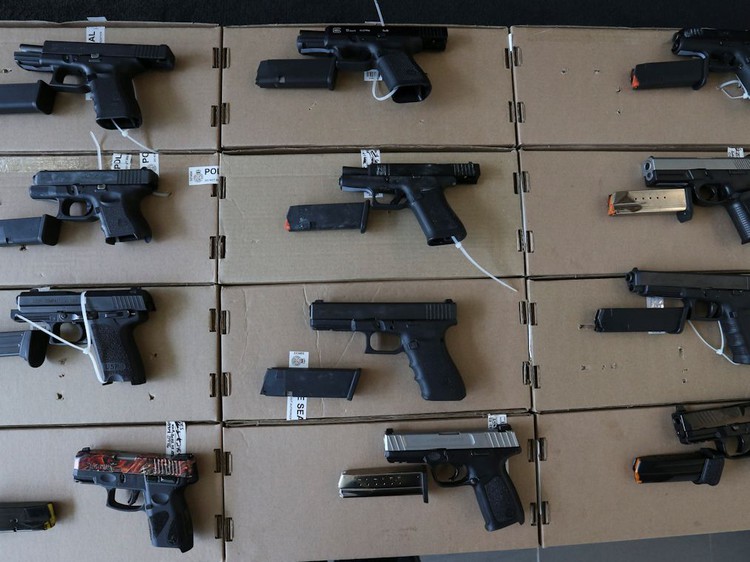
 apple.news
apple.news
Bill C-5 – which passed the House of Commons in June and is currently before the Senate – would eliminate mandatory minimum sentences for a series of violent gun crimes including “discharging firearm with intent” and “robbery with a firearm.”
According to the bill’s own legislative summary, relaxing prison sentences for gun criminals is meant as a move against “systemic racism,” since Canadians convicted of gun crimes are disproportionately Black and Indigenous.
In February, Toronto Police Deputy Chief Myron Demkiw testified to a House of Commons committee that the guns on Toronto streets were not “domestically sourced.” “Our problem in Toronto is handguns from the United States,” he said.
In July, a profile by Reuters cited 2021 data from Ontario’s Firearms Analysis and Tracing Enforcement program to show that 85 per cent of handguns used in crimes in the province had U.S. origins.
“We really think that restricting lawful handgun ownership doesn’t meaningfully address the real issue, which is illegal handguns obtained from the United States,” Evan Bray, chief of the Regina Police, told Reuters at the time.
Despite all this, the Trudeau government’s most public moves against gun violence have mostly been in the realm of tightening restrictions on legal firearms owners. Most recently, this has included a push to “freeze” the legal sale of handguns.
Handguns in Canada are already subject to much tighter restrictions than rifles and shotguns. With rare exceptions, pistols can only legally exist in one of three places: Locked up at home, at a licensed range, or in a car moving between those two locations.
But the Liberal plan would tighten restrictions still further by banning the sale or transfer of handguns outright. In August, this began with a temporary halt on legal handgun imports into Canada.
In his February testimony before the House of Commons Public Safety Committee, Toronto Police Deputy Chief Denkiw said that the freeze would do little to curb the city’s recent spike in gun crime. The legislation “is certainly not going to deal with the crime problem we’re facing in Toronto as it relates to criminal handguns and the use of criminal handguns,” Denkiw told MPs.
Simultaneous to the gun freeze, Ottawa is pursuing legislation that would actually reduce punishments for gun criminals???
FIRST READING: A polite reminder that Canadian handgun crime is mostly America's fault — National Post
As Trudeau government cracks down on legal gun owners, the 'vast majority' of crime guns are coming across the border
Bill C-5 – which passed the House of Commons in June and is currently before the Senate – would eliminate mandatory minimum sentences for a series of violent gun crimes including “discharging firearm with intent” and “robbery with a firearm.”
According to the bill’s own legislative summary, relaxing prison sentences for gun criminals is meant as a move against “systemic racism,” since Canadians convicted of gun crimes are disproportionately Black and Indigenous.
As the Trudeau government deepens their crackdown on the legal ownership of handguns, evidence continues to emerge showing that Canadian handgun crimes are committed almost exclusively with smuggled U.S. weapons.
Two more provinces join in opposition to gun buyback program that 'unnecessarily targets lawful gun owners' — National Post
Ministers in Saskatchewan and Manitoba agree with Alberta's Tyler Shandro, who earlier this week called the program wasteful
Saskatchewan and Manitoba have followed Alberta’s lead and informed the federal government they won’t use local resources to enforce a federal initiative they don’t support.In February, Toronto Police Deputy Chief Myron Demkiw testified to a House of Commons committee that the guns on Toronto streets were not “domestically sourced.” “Our problem in Toronto is handguns from the United States,” he said.
In July, a profile by Reuters cited 2021 data from Ontario’s Firearms Analysis and Tracing Enforcement program to show that 85 per cent of handguns used in crimes in the province had U.S. origins.
“We really think that restricting lawful handgun ownership doesn’t meaningfully address the real issue, which is illegal handguns obtained from the United States,” Evan Bray, chief of the Regina Police, told Reuters at the time.
Christine Tell, Saskatchewan’s Minister of Corrections, Policing and Public Safety, wrote a letter to the highest-ranking RCMP officer in the province telling them not to use provincial resources for the program.
“The Government of Saskatchewan does not support and will not authorize the use of provincially funded resources for any process that is connected to the federal government’s proposed ‘buyback’ of these firearms,” she said in the letter.Despite all this, the Trudeau government’s most public moves against gun violence have mostly been in the realm of tightening restrictions on legal firearms owners. Most recently, this has included a push to “freeze” the legal sale of handguns.
She said the government has heard often from the RCMP that they don’t have enough resources.
“It would seem to be counter intuitive to take our front-line resources from our provincial policing service to carry out a federally mandated administrative program.”
Manitoba’s attorney general Kelvin Goertzen posted on Facebook that he had also written to federal Public Safety Minister Marco Mendicino to oppose the program.Handguns in Canada are already subject to much tighter restrictions than rifles and shotguns. With rare exceptions, pistols can only legally exist in one of three places: Locked up at home, at a licensed range, or in a car moving between those two locations.
“We feel many aspects of the federal approach to gun crimes unnecessarily target lawful gun owners while having little impact on criminals, who are unlikely to follow gun regulations in any event,” he said. “In Manitoba’s view, any buyback program cannot further erode precious provincial police resources, already suffering from large vacancy rates, from focusing on investigation of violent crime.”
Jason Watson, a spokesperson for B.C’s public safety minister said they’re willing to work with the federal government.
“The government supports any measures that are proven to enhance public safety and we will continue to consult with our federal counterparts,” he said in an email.
But Watson said the program is not a top priority for the B.C. government.
While the RCMP is a federal police force it provides contract policing to eight provinces and three territories with only Quebec and Ontario having their own provincial forces.
In general, larger cities have their own police forces, but smaller communities in those eight provinces rely on the RCMP for policing, with the federal government covering 30 per cent of the costs and provinces covering the rest.
Alberta was the first to oppose the federal buyback program earlier this week, with the province’s justice minister calling the program wasteful and unnecessary.
“It’s important to remember that Alberta taxpayers pay over $750 million per year for the RCMP and we will not tolerate taking officers off the streets in order to confiscate the property of law-abiding firearms owners,” said Tyler Shandro.
The instruction, the Alberta government said in a news release, falls under a section of its contract with the Mounties allowing the province to set the “objectives, priorities and goals” of the mounted police officers working within its borders. Mr. Shandro suggested that if the Mounties didn’t heed the provincial government, it would challenge the force through a dispute settlement system also outlined in the contract.But the Liberal plan would tighten restrictions still further by banning the sale or transfer of handguns outright. In August, this began with a temporary halt on legal handgun imports into Canada.
The federal government immediately dismissed the idea that either provincial government could order the Mounties to circumvent federal gun law they oppose.
Mendicino said earlier this week that Shandro’s statements were regrettable, and called them an “abdication of responsibility.”
He said the weapons in question need to come off the street.
“As we look to get these assault style rifles, which again have carried out extensive, massive casualties in our country, it is imperative that we work together collaboratively.”
He said Shandro’s stance was disappointing.
“To simply say that you’re not going to cooperate, you’re going to resist does not allow us to move forward to accomplish the objective of this program,” said Mendicino.
Mendicino also pointed out courts have consistently ruled that firearms regulation is in the hands of the federal government.
While the Mounties, of course, are a federal police force, Mr. Shandro said that he had the authority to issue the directive because the force, as is the case in most provinces, also acts as Alberta’s provincial police under a contract with Alberta.
“Alberta taxpayers pay over $750 million per year for the R.C.M.P., and we will not tolerate taking officers off the streets in order to confiscate the property of law-abiding firearms owners,” Mr. Shandro said at a news conference.
According to the Saskatchewan firearms officer, that means the RCMP will have to make some decisions going forward because the police services get more than $200 million from the provincial government for their policing operations in Saskatchewan.

Sask. government pulling money away from federal gun buyback
The Saskatchewan government is trying to put its foot down when it comes to guns. In 2020, the federal governm...
 www.cjme.com
www.cjme.com
While the RCMP is a federal police force it provides contract policing to eight provinces and three territories with only Quebec and Ontario having their own provincial forces.In his February testimony before the House of Commons Public Safety Committee, Toronto Police Deputy Chief Denkiw said that the freeze would do little to curb the city’s recent spike in gun crime. The legislation “is certainly not going to deal with the crime problem we’re facing in Toronto as it relates to criminal handguns and the use of criminal handguns,” Denkiw told MPs….
In general, larger cities have their own police forces, but smaller communities in those eight provinces rely on the RCMP for policing, with the federal government covering 30 per cent of the costs and provinces covering the rest.
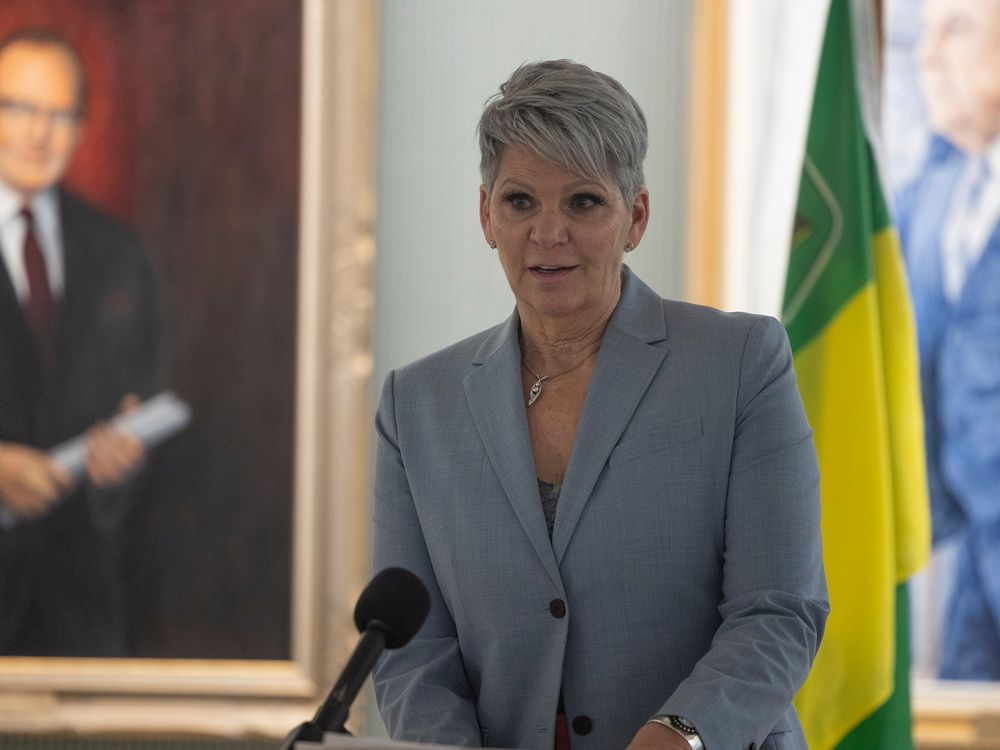
Christine Tell says Sask. won’t fund Ottawa’s buyback gun program
Minister Christine Tell wrote to the Saskatchewan RCMP it would be “counterintuitive” to use policing resources on the federal program.
Tyler Shandro, the Alberta provincial minister of justice and solicitor general, said that he had instructed Deputy Commissioner Curtis Zablocki, the head of the Royal Canadian Mounted Police in Alberta, to “refuse to participate” in the program, which will require owners of more than 1,500 models of rifles that are now illegal to turn them in to the police.
Christine Tell, Saskatchewan’s public safety minister, soon sent a similar letter to the head of the Mounties in her province expressing the government’s opposition to police involvement in the new gun control program.
Tell wrote the Saskatchewan RCMP is already “extremely burdened” with other tasks, noting the police service has indicated it needs additional resources.
With that in mind, she stated the dollars could be better used.
“The Government of Saskatchewan nor the ministry feel that using our already precious and highly trained, heavily tasked police resources assigned to providing policing in our province is an appropriate use of resources, enhancing public safety in any way or in the best interest of the people of Saskatchewan,” she wrote.
Tell stated that while the government supports anti-crime programs related to illegal firearms, it can’t stand behind the federal program that she says only impacts law-abiding citizens.

Trudeau is going to take Alberta’s guns away
Shandro, the Albertan Justice Minister has reportedly ordered the RCMP to not carry out the federal gun buyback program in the province.
Federal Firearms Ban FAQ - Saskatchewan Wildlife Federation
Bill C-21 Update: November 2022 The Federal Government introduced a significant amendment to Bill C-21, which expanded the definition of a prohibited firearm, effectively banning millions of hunting and sporting […]
To get an opinion from the RCMP on this issue you have to go back to January:
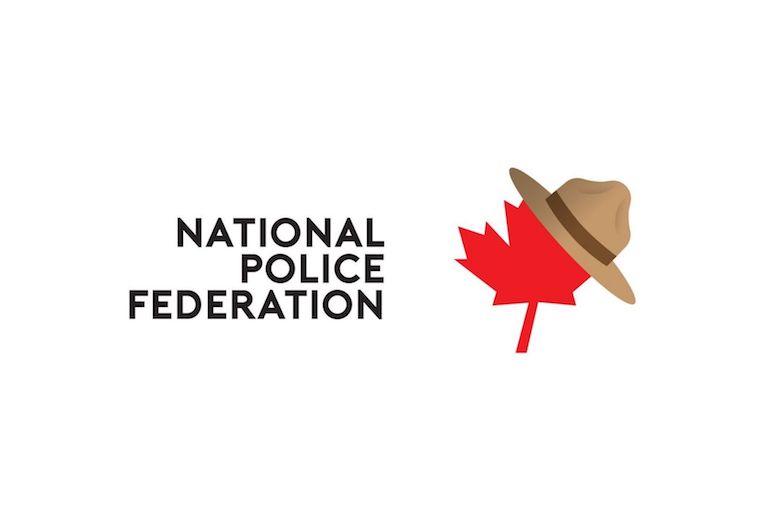
RCMP union questions firearms buyback - Ontario OUT of DOORS
RCMP union questions the federal government’s strategy to reduce gun crime through the pending buyback of semi-automatic centrefire rifles.
Section 6.1 of the Provincial Police Services Agreement states that, “The Provincial Minister will set the objectives, priorities and goals of the Provincial Police Service.” Meanwhile section 6.4 of the agreement states, “Nothing in this Agreement will be interpreted as limiting in any way the jurisdiction of Alberta in respect of the administration of justice and law enforcement in the Province.”
He made it clear that he doesn’t see taking firearms from legal, licenced gun owners as a priority when the province has other policing and crime issues to deal with. While Mendicino portrays that as Alberta trying to “opt out of a federal law” it’s actually Alberta following the contract they have with the federal government for the Mounties.
What the federal government is trying to do is to get provincial and local police services to do their work for them and Alberta, now joined by Saskatchewan (and now Manitoba, and per are saying no. It would be the equivalent of the federal government telling the Surete du Quebec or the Ontario Provincial Police what their priorities would be and then getting upset if Ontario or Quebec disagreed.
The real problem here isn’t that provincial governments are pushing back on bad policy, it’s that the Trudeau government announced their policy without having any real way of implementing it.
At the national level, the RCMP doesn’t have the resources to carry out this gun collection program they want to launch by the end of the year. The Mounties have told the government they don’t have the resources.
Canada Post was also considered as a potential partner in the collection of firearms, and they too have told the Trudeau government they are not able to handle the volume of firearms being returned.
So now, the federal government has written to the provinces, and some cities, asking them to divert precious police resources to running their program to take guns away from people not breaking the law. Most jurisdictions don’t have enough resources to deal with those breaking the law.
While Alberta and Saskatchewan are outright saying they won’t help with the new program, even Ontario is urging the feds to focus on smuggled guns coming across the border.
“Ultimately, we encourage the federal government to focus on the measures needed to stop the root causes of gun violence, like stopping illegal guns from crossing the border and reducing the chances for repeat offenders to commit further crimes,” said Michael Harrison, spokesperson for the province’s solicitor general.
That’s the kind of hard work the Trudeau government has refused to do. They also didn’t have a plan for how to carry out this ban and “buyback” before they announced it. The latest political fight between the federal government and Alberta shows just how poorly thought out the gun ban and “buyback” program really is.
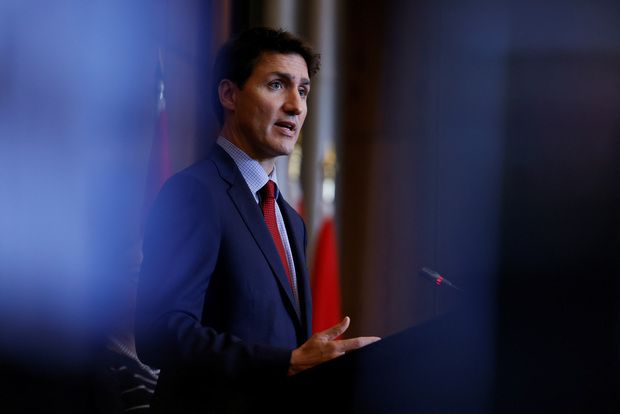
 torontosun.com
torontosun.com
He made it clear that he doesn’t see taking firearms from legal, licenced gun owners as a priority when the province has other policing and crime issues to deal with. While Mendicino portrays that as Alberta trying to “opt out of a federal law” it’s actually Alberta following the contract they have with the federal government for the Mounties.
What the federal government is trying to do is to get provincial and local police services to do their work for them and Alberta, now joined by Saskatchewan (and now Manitoba, and per are saying no. It would be the equivalent of the federal government telling the Surete du Quebec or the Ontario Provincial Police what their priorities would be and then getting upset if Ontario or Quebec disagreed.
The real problem here isn’t that provincial governments are pushing back on bad policy, it’s that the Trudeau government announced their policy without having any real way of implementing it.
At the national level, the RCMP doesn’t have the resources to carry out this gun collection program they want to launch by the end of the year. The Mounties have told the government they don’t have the resources.
Canada Post was also considered as a potential partner in the collection of firearms, and they too have told the Trudeau government they are not able to handle the volume of firearms being returned.
So now, the federal government has written to the provinces, and some cities, asking them to divert precious police resources to running their program to take guns away from people not breaking the law. Most jurisdictions don’t have enough resources to deal with those breaking the law.
While Alberta and Saskatchewan are outright saying they won’t help with the new program, even Ontario is urging the feds to focus on smuggled guns coming across the border.
“Ultimately, we encourage the federal government to focus on the measures needed to stop the root causes of gun violence, like stopping illegal guns from crossing the border and reducing the chances for repeat offenders to commit further crimes,” said Michael Harrison, spokesperson for the province’s solicitor general.
That’s the kind of hard work the Trudeau government has refused to do. They also didn’t have a plan for how to carry out this ban and “buyback” before they announced it. The latest political fight between the federal government and Alberta shows just how poorly thought out the gun ban and “buyback” program really is.

LILLEY: Trudeau's fight with Alberta is all because he doesn't know how to collect guns he banned
The feds don't know how they will get guns out of the homes of licenced gun owners which is what the fight with Alberta is all about.
Hard to find anything dumber than that. Maybe blacks and indigenous just are not cut out to be criminals. Or at least not good ones.As the Trudeau government deepens their crackdown on the legal ownership of handguns, evidence continues to emerge showing that Canadian handgun crimes are committed almost exclusively with smuggled U.S. weapons.
According to the bill’s own legislative summary, relaxing prison sentences for gun criminals is meant as a move against “systemic racism,” since Canadians convicted of gun crimes are disproportionately Black and Indigenous.
Mendicino says Alberta's resistance to federal gun buyback plan is 'reckless' and 'a political stunt' — CTV News
Federal Public Safety Minister Marco Mendicino is calling Alberta Justice Minister and Solicitor General Tyler Shandro's plan to direct RCMP in the province not to enforce confiscations of prohibited firearms 'reckless,' and is amounting it to 'a political stunt' that won't hold up.
"He's wrong about all of that, and let's take a step back. Assault-style rifles were designed for one purpose, and one purpose only. And that is to kill people, and they have in Canada," Mendicino said. "It's a political stunt. He knows full well that the regulatory powers when it relates to firearms falls squarely within the exclusive jurisdiction of the federal government."
The provinces reply, “You want it? You pay for it. We have other priorities for the law enforcement that we’re paying for.”
Mendicino said it was "reckless" for Shandro "to be insinuating that the RCMP will not be enforcing federal law," because he does not speak for the RCMP, and it is up to the police to determine how offences are to be handled.
Section 6.1 of the Provincial Police Services Agreement states that, “The Provincial Minister will set the objectives, priorities and goals of the Provincial Police Service.” Meanwhile section 6.4 of the agreement states, “Nothing in this Agreement will be interpreted as limiting in any way the jurisdiction of Alberta in respect of the administration of justice and law enforcement in the Province.”
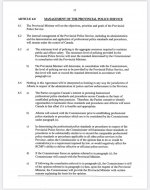
(I’m sure the other provinces will have similar agreements)
More funding for 5 H turkey shoots will reduce gun crime.Clearly, the solution to all Canada's problems is more guns.
It simply means that if the RCMP are to take away guns, they have to do it on the federal dime.